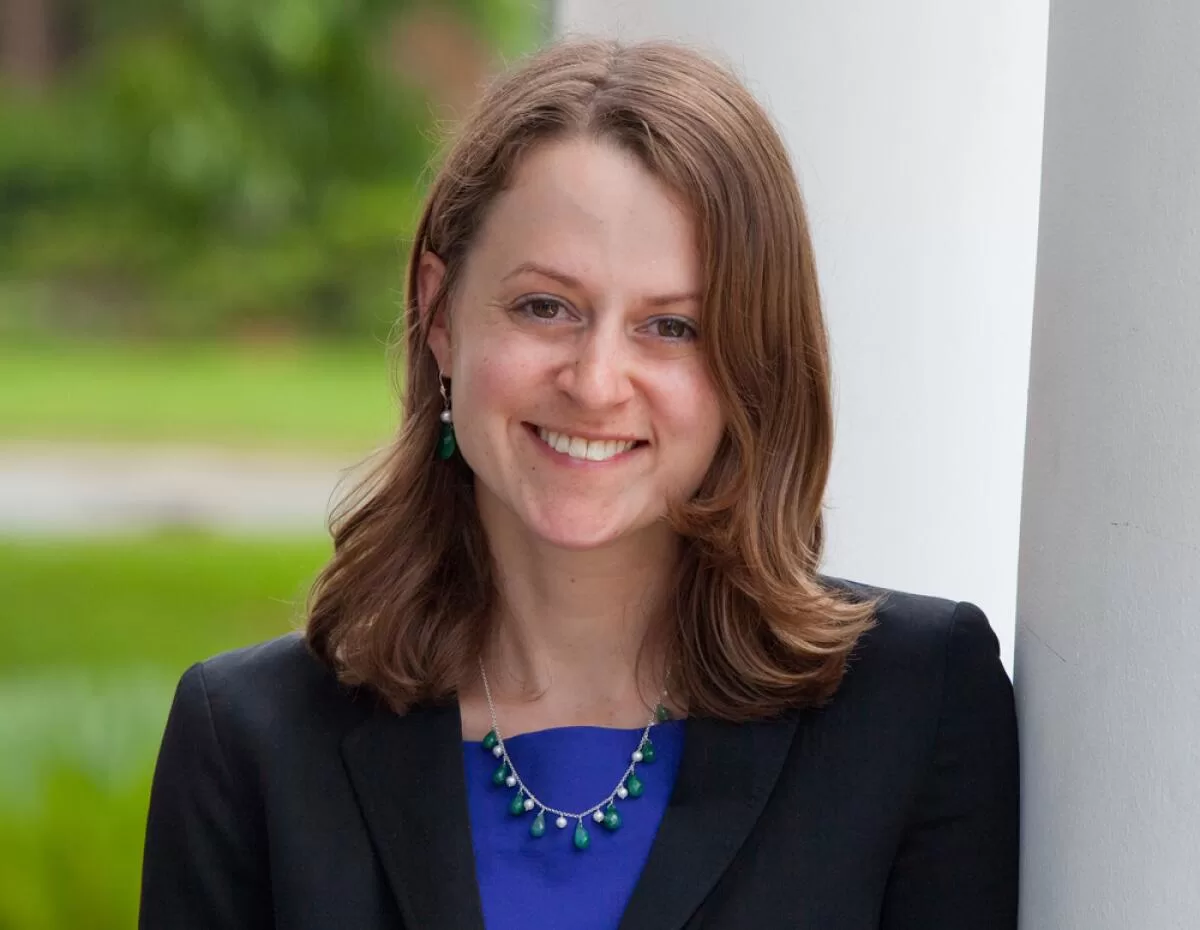Standing athwart that conflict is Mary Ziegler: Interpreter, guide, prognosticator.
Whenever a law is passed, a court decision rendered, a medical horror story surfaced — which happens not infrequently — Ziegler is invariably asked to weigh in from her perch at UC Davis. She’s given as many as 15 interviews in a day.
That ubiquitous presence, Ziegler’s frequent written commentary and the six books she’s published, with a seventh on the way, have made the 42-year-old law school professor, in the estimation of historian David Garrow, the preeminent authority on the past 50 years of abortion wars.
“One of the hallmarks of Ziegler’s scholarship,” he noted in a laudatory 2021 book review, “is her outreach to activists and litigators on both sides.”
That’s why she’s a trusted and valuable source, residing on the speed-dial of countless reporters nationwide.
Ziegler, who came to Davis in 2022 by way of Florida State University, didn’t set out to become a one-stop clearinghouse for history, commentary and abortion arcana. Her inquisitiveness led her there.
She developed her interest in the mid-2000s, as a Harvard Law School student.
A professed “legal history nerd,” Ziegler found a dearth of scholarly research on the social and political fallout from Roe vs. Wade, the 1973 decision spelling out a constitutional right to abortion. She began diving into digitized newspaper archives, to learn more, and started writing, prolifically, on the subject.
Initially, “I didn’t think I would do anything professionally,” Ziegler said last week over lunch in this bayside enclave she calls home. “What interested me was just pure curiosity.”
“At the time,” she added, with a laugh, her scholarship “obviously wasn’t as relevant as it turned out to be later.”
(Ziegler’s father, a French professor, urged her to pursue a career that was practical and reasonably well-paying. She considered medicine, but doesn’t like the sight of blood. So law school it was.)
Ziegler, who published her first book-length treatment of the abortion issue in 2015, didn’t necessarily anticipate the reversal of Roe, which helped turn her into a quasi-legal and media celebrity. While opponents continuously sought to chip away at the landmark ruling, many considered the matter “settled law” — which is how Supreme Court nominee Brett M. Kavanaugh described Roe in 2018 as he faced Senate confirmation. (In 2022, Kavanaugh was part of the 5-4 ruling in Dobbs vs. Jackson that overturned the nearly half-century-old decision.)
The day the court issued that ruling, Ziegler burrowed into her work, writing furiously and conducting a long series of back-to-back-to-back interviews. When she finished, she broke down and cried.
It wasn’t just the striking down of a constitutional right, said Ziegler, an avowed feminist and supporter of legalized abortion.
“I remember reading Dobbs and the idea that somehow this was going to make it better and people were going to stop fighting. I remember thinking that is definitely not going to happen,” she said. “I thought about all the unintended consequences it was going to have” such as denial of urgent medical care — even in cases unrelated to abortion.
“That doesn’t mean I disparage people who think abortion is wrong. But, to me, criminalizing it and all that comes with that has always been a dark part of American history. I saw it setting us on a path to more conflict, not less.”
Which has proven abundantly true.
(Bill Lax / UC Davis)
In a recent piece on Lt. Gov. Eleni Kounalakis and her gubernatorial ambitions, your friendly columnist ventured to say abortion rights were rock-solid in California, with its constitutional guarantee and Democrat’s hegemonic control of Sacramento.
Ziegler doesn’t necessarily agree.
“I don’t think Congress is going to do anything,” she said, noting the risk of a severe political backlash. “I’m less sure about [former President] Trump.”
If elected in November, she said, Trump could unilaterally invoke the Comstock Act, a dusty 1873 anti-vice law that could serve as an effective nationwide abortion ban. While she made no prediction, Ziegler didn’t rule out the prospect. With Trump, you never know.
“I don’t think it’s a crisis,” she said. “That seems overblown to me. But I also think complete complacency … is wrong, too.”
“On the one hand,” she went on, “it’s not going to be popular if he does it. On the other, I don’t know what his incentives are if he can’t run for reelection. Maybe his donors like it. Maybe base voters who buy his merchandise like it.”
A pale sun glinted off San Francisco Bay as tourists plied the waterfront promenade. Politics and the abortion debate seemed far off, for the moment.
Ziegler sees the next several years as a push-pull between conservative judges, anti-abortion lawmakers and the majority of Americans who, by and large, wish to keep abortion legal and accessible.
“I think it depends on who’s deciding, and I don’t mean in the classic, ‘It’s my body, my choice’ way of who’s deciding,” Ziegler said. “We’ve seen to date that, for the most part, when you ask voters directly, they want abortion to be broadly legal, particularly early in pregnancy and increasingly later in pregnancy as well… But I think there are lots of possibilities where that doesn’t happen.”
With that, she boxed her leftovers and headed home, to further explain and explore America’s abortion fight.
